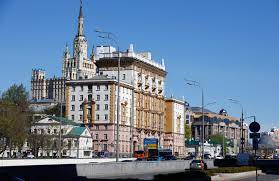
Russia’s Foreign Ministry on Thursday declared two U.S. diplomats “persona non grata” and ordered them to leave the country within seven days as they were allegedly involved in “illegal activity.”
The ministry charged in a statement that the first secretary at the U.S. Embassy in Russia, Jeffrey Sillin, and the second secretary, David Bernstein, “kept in touch” with a former employee of the U.S. Consulate in Vladivostok who was arrested earlier this year. The ex-employee was accused of collecting information for U.S. diplomats about Russia’s military action in Ukraine and related issues.
According to the statement, U.S. Ambassador to Russia Lynne Tracy was summoned to the ministry on Thursday and informed that Sillin and Berstein were being expelled.
“It was also emphasized that illegal activities of the U.S. diplomatic mission, including interference in the internal affairs of the host country, are unacceptable and will be resolutely suppressed. The Russian side expects Washington to draw the right conclusions and refrain from confrontational steps,” the statement said.
There was no immediate comment from the embassy or the U.S. State Department.
The “special military operation” is Moscow’s preferred term to describe the fighting in Ukraine.
The FSB, the successor to the KGB, also said it served summonses to question two U.S. diplomats who allegedly instructed Shonov to collect the information. Russia’s state newspaper Rossiyskaya Gazeta cited the FSB spokespeople as saying that those diplomats were Sillin and Bernstein.
Shonov’s arrest was first reported in May, but Russian authorities provided no details at the time. The U.S. State Department condemned his arrest, saying the allegations against Shonov were “wholly without merit.”
Shonov was charged under a new article of Russian law that criminalizes “cooperation on a confidential basis with a foreign state, international or foreign organization to assist their activities clearly aimed against Russia’s security.” Kremlin critics have said the formulation is so broad it can be used to punish any Russian who had foreign connections. It carries a prison sentence of up to eight years.
In its latest statement, the State Department said the use of the “confidential cooperation” law against Shonov “highlights the increasingly repressive actions the Russian government is taking against its own citizens.”
The State Department has said Shonov worked at the U.S. consulate in Vladivostok for more than 25 years. The consulate closed in 2020 because of the COVID-19 pandemic and never reopened.





